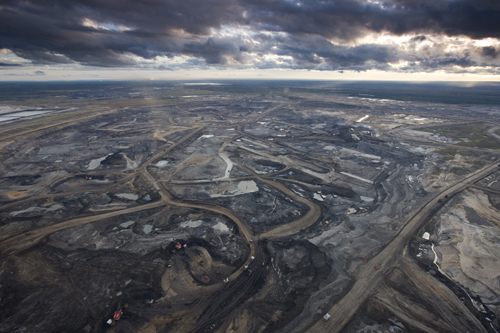A moratorium on any new oil sands expansion is imperative given Canada’s failure to properly assess the total environmental and climate impacts, Canadian and U.S. experts say in the prestigious science journal Nature.
Even with a moratorium it will be very difficult for Canada to meet its international promise to reduce CO2 emissions that are overheating the planet according to government documents as previously reported by DeSmog.
“Continuing to approve pipelines and new projects guarantees Canada will not meet the Harper government’s Copenhagen emissions reduction target,” said Wendy Palen, an ecologist at Simon Fraser University.
“These are the plain facts Canadians need to be aware of,” Palen, a co-author of the Nature commentary, told DeSmog.
Canadians also have no idea of the overall “big picture” of the impacts of oil sands production and transport because each project is assessed in isolation.
In total more than 280 square kilometres of boreal forest and peatlands have already been eliminated to make way for oil sands development. That amounts to an area more than twice the size of the City of Vancouver.
According to a 2012 study the destruction of this region of the boreal forest — a natural carbon sink — released about 100,000 tonnes of CO2 that had been safely stored underground. And it also meant the end of the region’s ability to absorb some 58,000 tonnes of CO2 every year. Over a 20-year time span that’s 1,161,000 tonnes of CO2 that stays in the atmosphere — close to half the annual emissions of the City of Vancouver.
This does not include CO2 emissions from developing oil sands projects themselves nor the emissions from burning millions of barrels of oil produced there each year.
This piecemeal approach is like determining the risk of cigarette smoking by only looking at the potential harm from smoking one cigarette, environmental economist Mark Jaccard said.
As critics have pointed out during recent pipeline review processes, regulators like the National Energy Board do not consider the climate impacts of pipelines and oilsands projects. It’s considered “out of bounds,” Jaccard, another coauthor of the report, said. Each project is presented as an ultimatum: approve the project or lose an economic opportunity, he said.
“This approach artificially restricts discussion to only a fraction of the consequences of oil development,” Jaccard and seven co-authors argued in the report. The authors represent an interdisciplinary group of experts in environmental science, economics, policy development and decision science.
What Canada and the U.S. need is a “more coherent approach” to evaluate all oil sands projects and pipelines in the “context of broader, integrated energy and climate strategies.”
But first Canada and the U.S. need to impose an immediate halt to new oil sands developments and related pipeline construction, the authors write. (The U.S. is considering developing its own oil sands in Utah and elsewhere). Then the two countries can jointly develop a strategy that allows energy developments to proceed only if they are within environmental limits and respect other national commitments to human health, social justice and biodiversity protection.
However this strategy would need a formal, legislated acknowledgement of the reality that oil sands development impacts the climate. It also should create either a carbon tax or cap-and-trade mechanism to ensure the oil industry absorbs “the full social costs of carbon combustion.”
Finally this strategy should assess the full range of potential impacts compared to alternatives. And it should include the options of saying “no” to a project.
Former Secretary of State Hillary Clinton said Canada and the U.S. need to co-ordinate their climate policies in an interview on the CBC’s The National. She acknowledged we need to get beyond project-by-project approvals.
With new regulations on power plants, the U.S. may be on its way to meeting its Copenhagen emission reduction target, which is identical to Canada’s.
While Prime Minister Harper “clearly doesn’t care about climate change,” Jaccard told DeSmog, President Obama does and could make approval of the Keystone XL pipeline contingent on Canada meeting its 2020 target.
“Economists around the world now agree the costs of carbon pollution far outweigh the benefits,” Jaccard said.
This article was first published on DeSmog Canada.
Stephen Leahy is the senior science and environment correspondent at Inter Press Service News Agency (IPS) based in Rome and Montevideo. To continue this work at a time of severe cutbacks and closure of many media, Leahy launched Community Supported Journalism.
Photo: Elias Schewel/flickr




